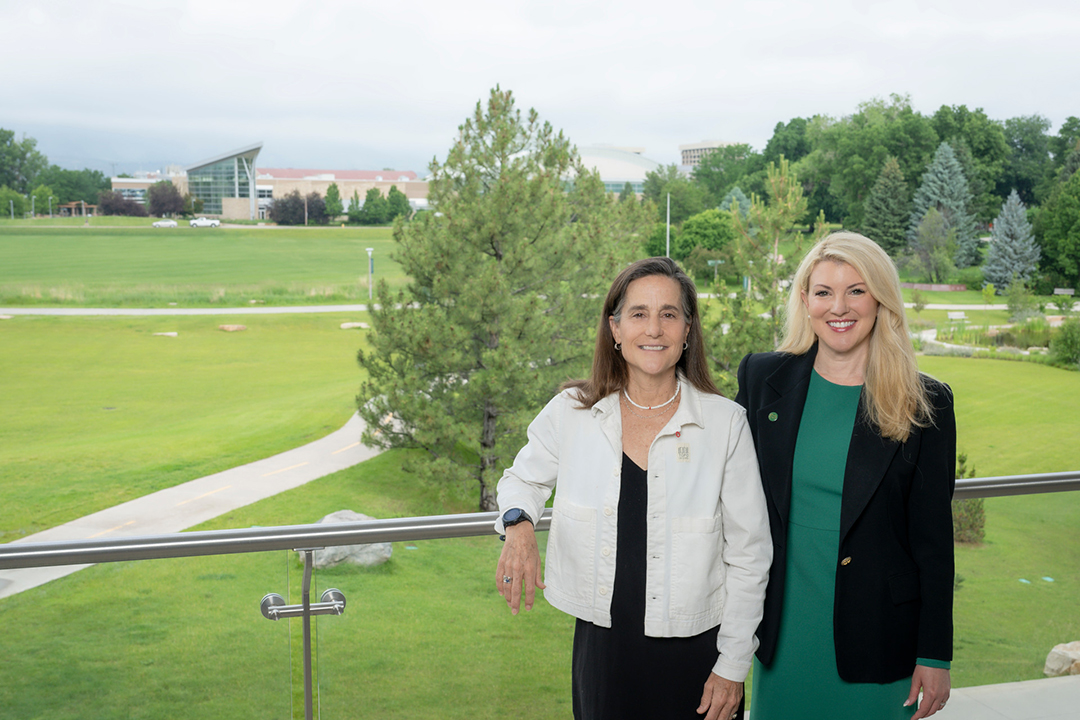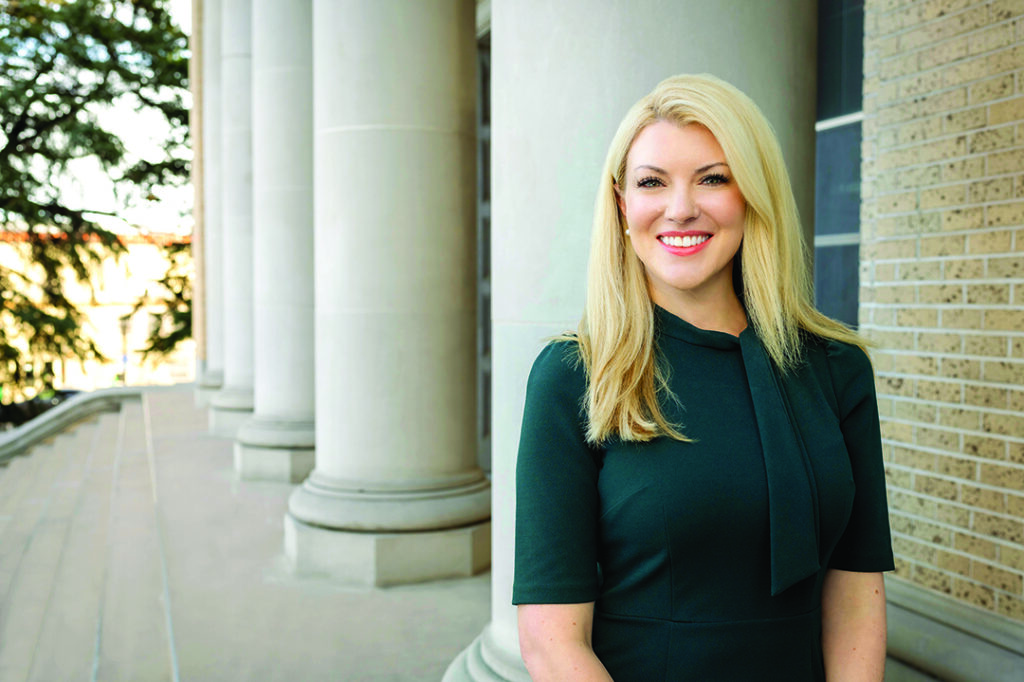
CSU President Amy Parsons – Photo by CSU Photography
Amy Parsons – President of Colorado State University
Colorado State University students could bump into Amy Parsons on campus and think she was an alumna, someone’s mom or maybe even a TA for a class they’d only attended twice.
If they see her at a football game, her voice might be a bit hoarse, just like their own. They may even see her in Old Town, though they probably wouldn’t be at the same bar.
Parsons believes her time at CSU, and her love for it as a result, makes her relatable to students. They have a shared experience that bonds them together, even if she’s their president.
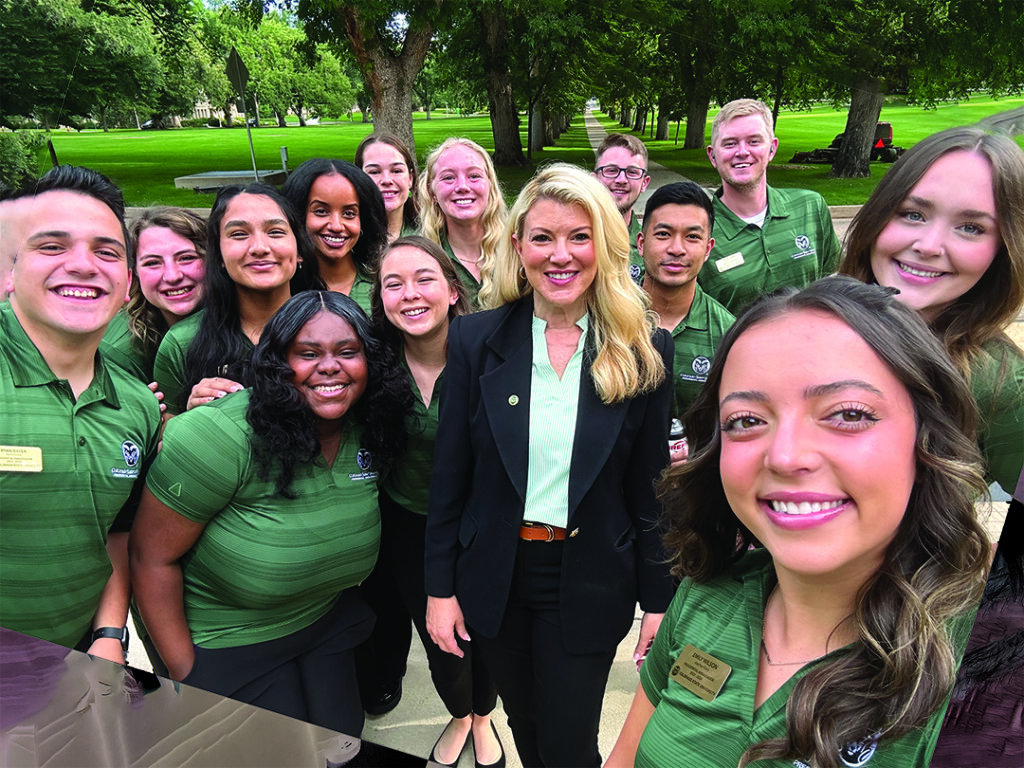
CSU Presidential Ambassadors, a group of student leaders representing the Office of the President, took a group selfie with President Amy Parsons during their summer training. Photo courtesy of CSU.
“I’m unapologetic about my own CSU roots,” Parsons says. “I love connecting with CSU students and alumni. I’m friends with fans and donors. Hopefully they meet me coming from a true place of experience and [see] that I’m doing this job from a place of love and passion.”
Parsons started her first year as CSU’s 16th president on Feb. 1, but she was already a Ram and proud of it. She says her college experience at CSU was “transformational” and that Fort Collins, just 45 minutes from where she grew up in Cheyenne, Wyo., felt like a “magical place,” even when she was a kid. She’s still friends with some of the faculty who taught her as a political science major bound for law school. CSU, she says, has that “rare and unique combination of research and academics set in such an incredibly beautiful institution.”
Not surprisingly, she considers preserving the student experience one of her top priorities. She wants students to leave CSU feeling the same way about it that she does. That’s a nebulous thing, she acknowledges, but there are very real things CSU can do, like remaining accessible for students of all backgrounds and supporting Fort Collins to keep its lifestyle and experiences as authentic as they were when she was in college.
Despite sounding twitterpated when she talks about CSU, Parsons didn’t really consider the presidency until it became available a year ago, when she was working as CEO of a company that specializes in Italian beauty products. She’d held many leadership roles at CSU, including executive vice chancellor of the CSU System for five years, until 2020. She guarantees she never thought about it as a student, when all she wanted to be was a lawyer because she saw so many females in that role on TV.
“It was something I felt like I could do, and [it could be] an exciting path for a woman,” she says, “one where I could be successful.”
Law school led Parsons back to CSU. When she was a first-year at The University of Colorado Law School, she asked the attorneys working for CSU if she could work for them for free as an intern.
She worked as a litigator for Brownstein, Hyatt and Farber of Denver beginning in 1999, and CSU hired her occasionally as outside legal counsel. In 2004, CSU offered her a full-time job as in-house legal counsel. She took the job because she had a daughter and wanted a better work-life balance.
Parsons might have gone after the presidency when it opened up last time, in early 2019, but she says her kids were still a little young for that kind of commitment. Instead, Joyce McConnell became the first woman to lead CSU and stepped down after three rocky years. Parsons is now the second.
Her agenda is still coming together, she says, after meeting with hundreds of state leaders across Colorado this summer. But she knows she wants students to leave with more than an education and an experience. She wants them to be “informed and enthusiastic members of civic society.” She’s already come up with a theme for this year, democracy, and she plans to bring in former Sen. Cory Gardner and current Sen. Michael Bennet to model it for students.
Is that a president’s job?
“Yes,” she says with force. “Students are more likely to vote and run for office and give to causes. They are more likely to be leaders. I think more than ever, with how divided the country is and how much shouting there is, it’s important that we are training our students to engage in civic discourse.”
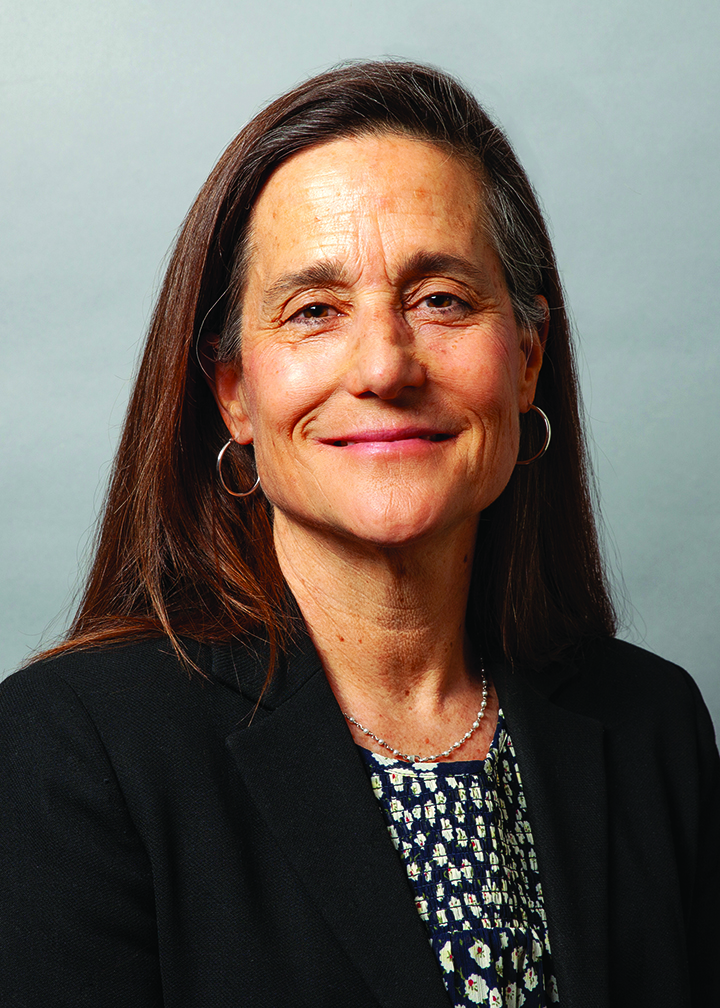
Jeni Arndt, Mayor of Fort Collins
Jeni Arndt – Mayor of Fort Collins
When Jeni Arndt won a seat to the Colorado legislature for the first time, she had to scramble to get ready for the first session. She’d never considered actually winning the race.
She had refused when community leaders asked her to run for the first time in 2013. She had three kids, a well-paying job and a husband who traveled a lot for work. Spending a few months at the capitol seemed impossible.
Public office didn’t scare her: She ran for student council throughout school. But she only considered going for the legislature after her husband said she would be good at it. She was convinced after a friend told her to think of it as asking the community if they wanted her in the seat. She didn’t think they would. She wore jeans to the election party.
“I ran only because I was asked to run,” she says, “and that is such a girl answer.”

Jeni Arndt
Female elected officials often have to be asked several times to run, Arndt says. A well-worn joke bandied about by those women is that men see a senator in the mirror as they’re brushing their morning breath away. But that is the only real gender difference she’s noticed in her career in politics.
“I think that’s changed, too, in the last 10 years since I ran,” Arndt says. “That’s a good thing.”
In fact, she was sure enough of herself to do something a little crazy by resigning from the legislature after two terms to become mayor of Fort Collins, her hometown. She was term-limited anyway, but others convinced her the move would benefit her hometown.
“It really is about service, and I know that sounds so corny,” Arndt says, “I don’t like unclogging the toilet, but the toilet needs to be unclogged.”
Arndt loves to use humor and even some sarcasm to get her point across, perhaps as a result of her 5-foot frame that she believes causes her to be overlooked more often than her gender.
“I try to have sit-down meetings,” she says.
But she can’t be ignored forever. Democracy is cool that way, she says. Everyone gets one vote. When she was chair of the House Committee on Agriculture, she reminded a colleague who seemed to favor Sen. Jerry Sonnenberg, chair of the Senate’s agriculture committee, that she could kill his bill “just as much as Jerry.”
“You have to stand your ground,” she says.
Arndt says a commitment to hard work is the real key to success. But she notes that Fort Collins’ city manager is a woman, and the new president of Colorado State University is a woman. Most of the big jobs are filled by women, and she’s not even sure if they had to be asked first.

Amy Pezzani holds up turkeys during the Tour de Turkey in 2021. Photo courtesy of Larimer County.
Amy Pezzani – CEO at Food Bank for Larimer County
Amy Pezzani was just three years out of college when the executive director of the Springfield, Mo., food bank asked her to apply for his job.
“I would have never done that on my own,” she says.
He was impressed with her vision. She came to the food bank as a volunteer after joining AmeriCorps VISTA, what she calls the domestic version of the Peace Corps. The organization wants their young volunteers to start a new program in their nonprofit. Pezzani started three.
She hesitated to apply even as her boss pushed her. She didn’t know the concept of a food bank existed before she got there, even as she used food stamps while putting herself through college, and the only worldly experience she had was a trip to Memphis with her family.
But she did apply, and she got the job. She immediately learned one of the tough parts about being a leader: The co-workers she considered friends shunned her after she was promoted.
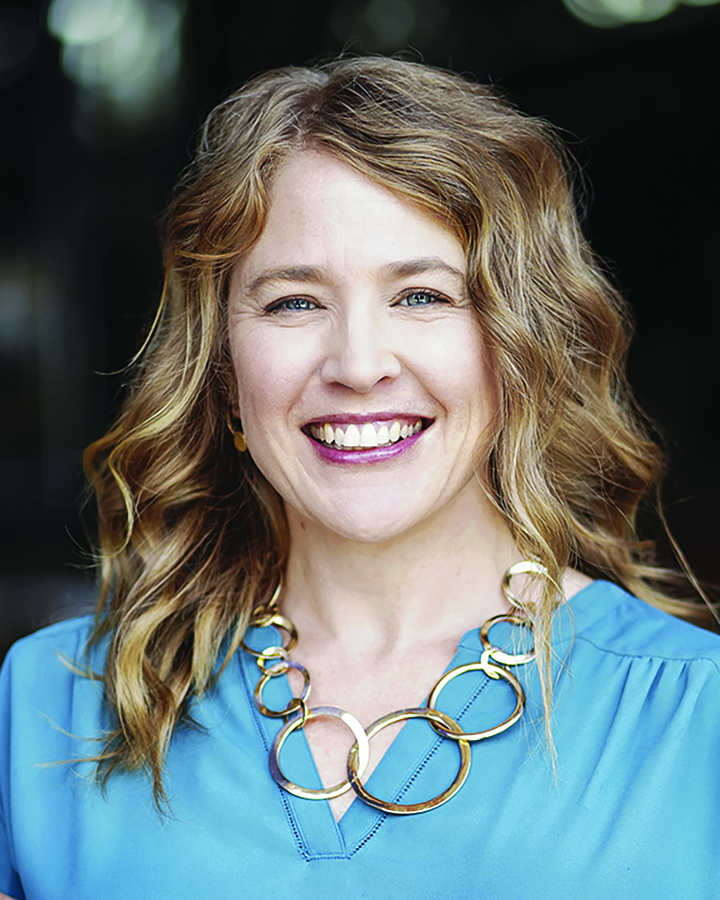
Amy Pezzani
“I had no idea how to be their boss,” she says.
When she moved to Northern Colorado in 2004, the Food Bank for Larimer County’s executive director position became available, and she applied.
Pezzani now leads an organization with a budget of $8 million. If you consider all the food that goes through the three facilities, she says, that budget is closer to $25 million. When she started, the food bank had 14 employees. Now it employs more than 50. It had one facility. Now there are three. She’s comfortable with being the boss.
“Experience makes decision-making easier,” she says.
At first, Pezzani didn’t realize the financial burden owned by leaders of organizations and businesses but went for an MBA to learn. She never finished it, but the courses she took about finance and economics were invaluable.
The board changed her title to CEO a few years ago due to her financial responsibility and the fact that her job felt more like a top executive role. Another reason was that the organization needed support from business and community leaders in Northern Colorado, and it was her job to ask for it.
“They wanted my title to match,” she says. “It was to give me that credibility, if you will.”
Pezzani likes to work in all three food bank facilities because she believes it makes her staff feel valued and important instead of viewing themselves as a satellite office.
“It’s culture,” she says. “Or else, when you do come in, they think it’s for something bad.”
She also rides with her truck drivers and, in the summer, she helps deliver food to kids. She does that to learn the “pain points” of her workers, but she also enjoys it.
“That’s one of my favorite things to do,” she says.
She’s most proud of the fact that she pays her employees what they would likely earn at for-profit businesses. As a result, one key staff member has worked for her for nearly 20 years, which is unheard of in an industry plagued by turnover. She doesn’t pay her staff more just because she’s nice; turnover is expensive and requires constant training by managers who will likely burn out, so it’s hard to make progress.
“People think we should pay employees less because we are a nonprofit,” Pezzani says. “Why? I don’t get behind that philosophy, and I’m grateful that my board doesn’t either. I’m extremely proud of the fact that we are a solid financial organization.”
She doesn’t think being a woman gave her any kind of advantage or disadvantage, but she also believes from her own experience that many women won’t apply for jobs unless they think they fit nearly all the qualifications. After all, she had to be talked into applying for her first head position. She tries to make it clear in her job posts that anyone who believes they would be a good fit should apply—and she means it.


